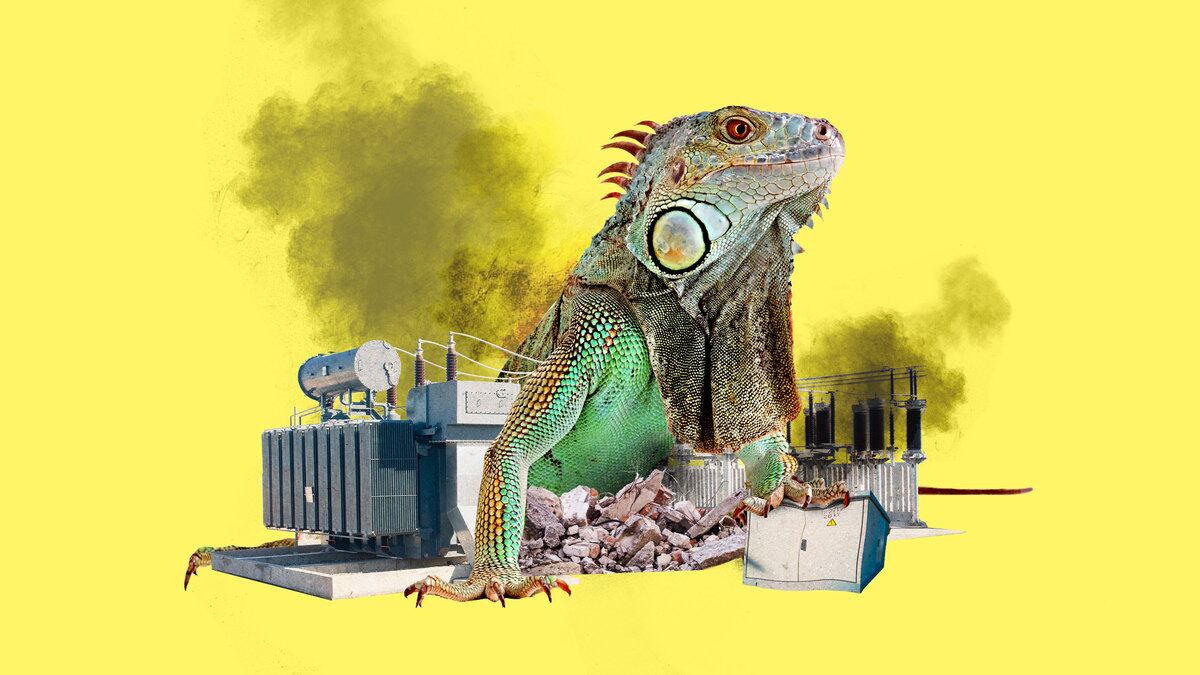After a brutal hurricane season, people across Florida have grown freshly accustomed to power outages. But at least four times in the last two months, Lake Worth Beach residents have been plunged into darkness thanks to a very different kind of culprit: iguanas.
“Some answer has to be devised to thwart these scaly chompers!” Susannah Amygdalitsis, one of 1,400 residents affected by an iguana-tripped power outage earlier this month, told The Daily Beast.
She noted it was her second time dealing with a reptile-related blackout.
“Hoping for really cold weather—and a team to scoop up all the fallen felons,” she added, referring to iguanas’ habit of falling out of trees when temperatures drop.
This year alone, residents have been subjected to at least 16 outages triggered by the reptile—which is considered an invasive species in the state of Florida—according to city spokesperson Ben Kerr. That number actually represents a downtick from the recent past: in 2020, the city experienced 28 outages caused by lizards. In 2021, iguanas triggered 20 blackouts in Lake Worth.
Still, interviews with residents suggest the city is littered with the massive green reptiles, which grow up to six feet long with a row of spikes on their neck, back, and tail. And experts say climate change could help explain the surge–with disturbing implications for the infrastructure in Florida and beyond.
“Climate change is likely contributing to the increase in iguana-triggered power outages because temperatures are staying warmer on average through the winter months,” Anna Savage, an associate professor in the University of Central Florida’s Department of Biology, told The Daily Beast. “Milder winters and warmer temperatures throughout the year… allow the iguanas in Florida to remain more active, even in winter, when they used to be slowed down or even frozen.”
First appearing in South Florida in the 1960s, iguanas are notoriously intolerant of cold. When the temperature in Florida falls below 40 degrees, the reptiles may “freeze” or become paralyzed by the change and fall from trees. The temporary paralysis has traditionally allowed private pet control companies to safely remove them.
But the change in temperature means that iguanas are able to stay active longer into the winter—unlike previous years, where cold fronts would force them into a hibernation-like state.

“This means more burrowing, climbing, and getting into man-made structures, including electrical subsystems, where they are big enough to cause power outages if they come in contact with the right elements,” Savage added.
The associate professor explained that one reason iguanas may be more successful at causing these power outages than other animals, like raccoons and birds, is by virtue of their large size and good climbing skills.
Kerr, the city spokesperson, told The Daily Beast that LWB Electrical Utility—the city’s own electrical service—has improved their power grids to be able to handle the weight of birds and sometimes even raccoons. But the sheer size of green iguanas allows them to make a connection with two parts of the electrical system—which is likely what has been causing the string of power outages. (Often, an iguana caught in a power grid will die from electrocution.)

“It’s so frustrating—and honestly, these iguanas are a nightmare,” Kerr told The Daily Beast. “We are doing everything in our power to correct the problem. We’re not just ignoring it—but it is such an extremely Florida problem to have.”
The city may be making efforts to mitigate the iguana problem, but it is also urging residents not to take matters into their own hands and kill them on their property (even if it is technically legal in Florida). Kerr asked for residents to instead call private professionals.
“Normally this time of year, we would be giving residents a warning that iguanas are falling because they are frozen,” the city spokesperson added. “But this year, we are dealing with an iguana power outage problem and urging residents not to try to handle the problem themselves.”
The problem in Lake Worth Beach may seem like a quirky manifestation of the larger array of threats posed by climate change in Florida, which were singled out by the United Nations in its report on climate disaster earlier this year. Sea levels are rising by an average of roughly one inch every three years, and more frequent tidal flooding is a bona fide menace.
But as further climate disruption looms, even those who theoretically stand to profit from the iguana problem in locales like Lake Worth Beach are calling for a more robust, public solution.
“We need to focus city funds and programs on removing iguanas—and not just let it fall on private companies to remove them,” Harold Antonio Rondan, an iguana trapper, told The Daily Beast. “We need to wage war on the iguanas, you know?”







